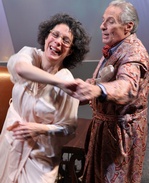SITE GUIDE
SEARCH
REVIEWS
REVIEW ARCHIVES
ADVERTISING AT CURTAINUP
FEATURES
NEWS
Etcetera and
Short Term Listings
LISTINGS
Broadway
Off-Broadway
NYC Restaurants
BOOKS and CDs
OTHER PLACES
Berkshires
London
California
New Jersey
Philadelphia
Elsewhere
QUOTES
TKTS
PLAYWRIGHTS' ALBUMS
LETTERS TO EDITOR
FILM
LINKS
MISCELLANEOUS
Free Updates
Masthead
A CurtainUp Review
Shpiel! Shpiel! Shpiel
|
Do you know what they call bananas in this country? Goldfingers.——Cornelius
|

Suzannr Toren and Itzy Firestone inn The Man Who Couldn't Stop Crying one of three plays that comprise the evening
|
Schisgal, perhaps best known for the film comedy, Tootsie (written with Larry Gelbart) is a native New Yorker who feels quite comfortable writing about Jews in urban situations. But these three plays are his first works to be translated into Yiddish (with English and Russian supertitles), which makes the stories of three different generations of Jews coping with life in the city all the more poignant and funny.
In The Pushcart Peddlers, directed by Motl Didner, the newly arrived Shimmel (Michael L. Harris) turns to the devious Cornelius (Stuart Marshall), a few jumps ahead of him on the road to assimilation, for advice on how to start a business. While Cornelius is conning Shimmel out of his money, Maggie (Dani Marcus), a "blind" flower girl walks by and steals Shimmel's heart, with hilarious results.
The Man Who Couldn't Stop Crying, directed by Gene Saks, is really an extended comic routine. Judith (Suzanne Toren) is fed up with her husband Benjamin (I.W. "Itzy" Firestone), who cries while reading the obituaries of people he doesn't know, watching seemingly harmless movies such as Jerry Lewis's The Nutty Professor, and viewing the St. Patrick's Day Parade. The laughter comes as the severity of Benjamin's affliction is gradually revealed.
The final and most developed of the plays is 74 Georgia Avenue, directed by Bob Dishy. In this one-act, Marty (Harry Peerce) a middle-aged man in an unhappy second marriage, seeks refuge in the East New York apartment where he was raised. The current resident is a black man named Joseph (Tony Perry), whose father was the custodian in the Williams Avenue synagogue where Marty and his family worshipped.
As Tony's wife, Cora, lies dying in the bedroom, Tony finds comfort in the various articles of clothing and religious objects he has salvaged from the now defunct synagogue. He also has developed the ability to channel many of the long since dead individuals who once attended the synagogue. Through Joseph, Marty not only rediscovers his roots but also finds a way to reconcile himself with his autocratic but much loved grandfather.
As a daughter of East New York, it would be almost impossible for this reviewer not to have been moved by 74 Georgia Avenue. After all, just like Marty and Joseph, I too attend P.S. 63, although my teacher was not Miss Brennan but Miss Kiviat (God rest her soul). When Marty and Joseph talk about the East New York Savings Bank on Pennsylvania Avenue, I immediately recall the little reindeers with sleigh that appeared on the lawn in front of the edifice every Christmas.
The genuine warmth and sincerity evinced by Perry and Peerce (as well as the actors in the other two plays) certainly had a great deal to do with my reaction. And the songs of troubador Lisa Fishman went a long way in keeping the mood between plays.
All three of these plays capture the irony, the humor and the special way Jews have been known to mix resignation with defiance and determination. If Jews have survived for five thousand years, is it too much to ask that the Folksbiene continue the traditions of Yiddish theater for many years to come?
|
Shpiel! Shpiel! Spiel! Three one-acts: The Pushcart Peddler, The Man Who Couldn't Stop Crying, 74 Georgia Avenue By Murray Schisgal Translated by Moishe Rosenfeld Directed by Motl Didner, Gene Saks, Bob Dishy Cast: Michael L. Harris (Shimmel), Stuart Marshall (Cornelius), Dani Marcus (Maggie), I.W. "Itzy" Firestone (Benjamin), Suzanne Toren (Judith), Tony Perry (Joseph), Harry Peerce (Marty), Lisa Fishman (Troubador) Scenic Design: Vicki R. Davis Costume Design: Gail Cooper-Hecht Lighting Design: Russel Phillip Drapkin Sound Design: Don Jacobs, Serena Rockower Supertitles Design: Matt Temkin Running Time: two hours, 30 minutes with one intermission The JCC in Manhattan, 334 Amsterdam Avenue (800) 595-4849 or www.folksbiene.org From 3/15/09; opening 3/19/09; closing 4/05/09 Wednesday & Thursday at 2pm and 8pm, Saturday at 8:30pm, Sunday at 2pm and 6pm Tickets: $55, $45 Reviewed by Paulanne Simmons March 19, 2009 |
|
REVIEW FEEDBACK Highlight one of the responses below and click "copy" or"CTRL+C"
Paste the highlighted text into the subject line (CTRL+ V): Feel free to add detailed comments in the body of the email. . .also the names and emails of any friends to whom you'd like us to forward a copy of this review. You can also contact us at Curtainup at Facebook or Curtainup at Twitter |
Try onlineseats.com for great seats to
Wicked
Jersey Boys
The Little Mermaid
Lion King
Shrek The Musical

South Pacific

In the Heights

Playbill 2007-08 Yearbook

Leonard Maltin's 2008 Movie Guide


Wicked
Jersey Boys
The Little Mermaid
Lion King
Shrek The Musical

South Pacific

In the Heights

Playbill 2007-08 Yearbook

Leonard Maltin's 2008 Movie Guide


